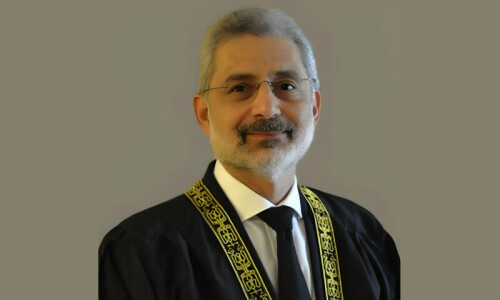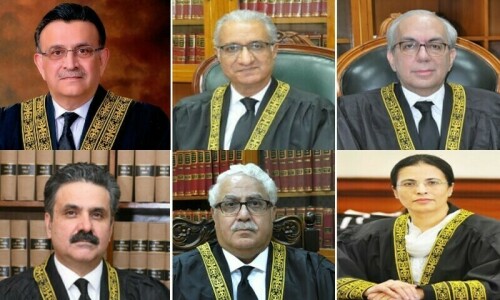Justice Yahya Afridi urges CJP to form full court to hear pleas against military trials of civilians
Supreme Court’s Justice Yahya Afridi — who is a member of the six-judge panel hearing pleas challenging the trials of civilians in military courts — has urged the chief justice of Pakistan to reconsider the reconstitution of the bench conducting proceedings into the case and refer the present petitions to a full court.
Justice Afridi passed these remarks in an additional note following the hearing on Friday (June 23).
A bench comprising CJP Umar Ata Bandial, Justice Ijazul Ahsan, Justice Muneeb Akhtar, Justice Afridi, Justice Sayyed Mazahar Ali Akbar Naqvi and Justice Ayesha Malik is hearing a set of petitions against civilians’ trials in military courts filed by former CJP Jawwad S. Khawaja, Aitzaz Ahsan, Karamat Ali, and PTI Chairman Imran Khan.
The bench initially comprised nine judges — including justices Qazi Faez Isa, Sardar Tariq Masood and Mansoor Ali Shah — but shrunk to six when the aforementioned three judges left the bench.
During the first hearing of the case on June 22, Justice Isa had said that he did not consider “this bench a bench”, adding that he could not be a part of any bench until the case relating to the Supreme Court (Practice and Procedure) Bill 2023 — which aims to deprive the office of the chief justice of Pakistan (CJP) of powers to take suo motu notice in an individual capacity and which has since become law — was decided.
Reading a statement out loud during the hearing, Justice Isa had regretted that he had no choice but to emphasise that constitutional institutions, such as the Supreme Court, should not be left on the whims and caprice of an individual by making it a “one-man show”.
Justice Masood had agreed with the puisne judge after which both of them had left the courtroom.
Meanwhile, Justice Shah had left the bench a day earlier after the government objected to his inclusion, saying that he was related to ex-CJP Khawaja.
In an additional note made public today, a copy of which is available with Dawn.com, Justice Afridi said that the entire edifice of a credible justice system was based on public trust.
“In the current politically charged scenario, where the term of the present government is drawing close to its end and the nation is gearing up for fresh elections, the political murmuring against the composition of the present bench could be palatable.
“But what is most serious and cannot be disregarded is that there are objections in writing from within the members of the bench, to the very constitution of the bench hearing the present petitions,” he pointed out.
Referring to Justice Isa’s statement, Justice Afridi said that the puisne judge had recorded his objections in writing which were now in the public domain.
“Thus the matter of the present composition of the bench warrants urgent attention and reconsideration by the CJP, lest it may dampen the public trust in the justice system.”
Justice Afridi clarified that he was not “endorsing or agreeing” with Justice Isa’s reasons, adding that he did not find it “appropriate to comment on the legality thereof” at the present stage of the proceedings.
“Yet, even if one may not agree with the law points raised in the objections of the senior puisne judge, propriety demands taking appropriate measures for ‘maintenance of harmony’ with the court, the ‘integrity of the institution’ and ‘public trust in the court’,” he highlighted.
As a first step, Justice Afridi continued, the appropriate measure would be the constitution of a full court to hear the petitions. “Without taking such a measure, I submit with the utmost respect, any judgment rendered in these petitions by the present bench may lead to the diminishing of the deference the decision requires and deserves,” he added.
Additionally, Justice Afridi said in his note that Attorney General for Pakistan Mansoor Usman Awan had told the court that 102 civilians from across the country were in military custody.
“The figure does not include any women, children, advocates and journalists,” he said.
The AGP, the judge stated, also gave figures of people in civilian custody — four in Khyber Pakhtunkhwa, 616 in Punjab and 172 in Sindh. Meanwhile, the figure for Balochistan was not provided.
“In Punjab, 81 women were taken into civilian custody, of which 42 have been either released or are on bail whereas the remaining 39 are in military custody,” the note added.
Justice Isa’s statement
Justice Isa’s statement, which was uploaded on the SC’s website on June 24 but later removed, said it was necessary to explain that since April 14 when the enforcement of the Supreme Court (Practice and Procedure) Act 2023 was suspended, he chose not to sit on the bench rather engaged himself in chamber work.
“Since I do not want to violate the order to suspend the law, therefore until the court decides about the vires of the law, I will not sit on the benches,” Justice Isa observed, adding if he hears the present case [challenge to the trial of civilians in military courts] as being part of the nine-judge bench then he would himself be violating the law, which he believes was constitutional and legal.
He said Section 2 of the Supreme Court (Practice and Procedure) Act 2023 applies only to the CJP and two senior-most judges of the apex court and that was the reason that Justice Sardar Tariq Masood had also avoided sitting on the benches in the beginning when the law was enacted.
But later Justice Masood decided to continue hearing the cases since the backlog of the cases was rising, but he chose not to hear cases which were filed while invoking Article 184(3) of the Constitution that deals with the enforcement of fundamental rights.
“We both respect the point of view of each other,” Justice Isa said, adding that being the most senior judge of the Supreme Court, it was his responsibility to keep the direction straight. “Until today, CJP has not contradicted my point of view rather did not even care to respond to my opinion,” Justice Isa regretted.
The statement also referred to the May 19 appointment of Justice Isa as head of the three-man judicial commission to inquire into audio leaks, but a bench of the Supreme Court, headed by the CJP, had stayed its proceedings. And despite the fact that one of the audio leaks also concerns a relative of the CJP, the case was again taken up on May 31 but later adjourned without assigning a new date of hearing.
Since the commission was also issued a notice, therefore a concise statement was submitted before the bench through its secretary in which Section 2 of the practice and procedure law was highlighted, emphasising the need for setting up a committee of three senior judges to constitute the benches rather than leaving it to the CJP’s discretion.
Justice Isa explained that CJP had put him into a quandary from which he could only come out when the petitions instituted against the vires of the practice and procedure law were decided or at least the stay granted against the enforcement of the law was withdrawn.















































Dear visitor, the comments section is undergoing an overhaul and will return soon.